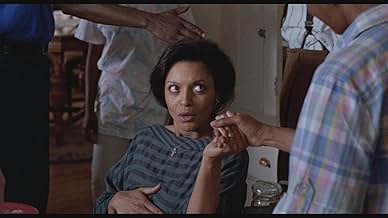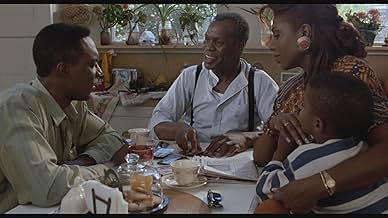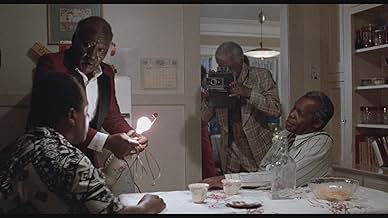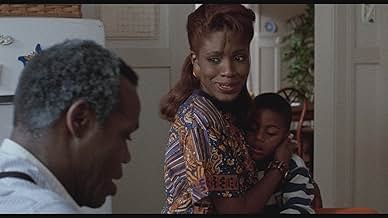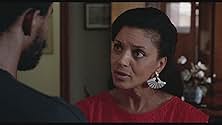CALIFICACIÓN DE IMDb
7.1/10
3.3 k
TU CALIFICACIÓN
Un viejo conocido carismático llega a la ciudad, lo que causa problemas a una familia apacible.Un viejo conocido carismático llega a la ciudad, lo que causa problemas a una familia apacible.Un viejo conocido carismático llega a la ciudad, lo que causa problemas a una familia apacible.
- Premios
- 7 premios ganados y 13 nominaciones en total
DeVaughn Nixon
- Sunny
- (as Devaughn Walter Nixon)
DeForest Covan
- Fred Jenkins
- (as DeForest Coven)
- Dirección
- Guionista
- Todo el elenco y el equipo
- Producción, taquilla y más en IMDbPro
Opiniones destacadas
Maybe it was the bizarre photo of a smirking, card-holding Danny Glover that always gave me the wrong impression of this film. I'm not entirely sure what I expected it to be, but I'm relatively certain I wasn't expecting a quiet family drama.
Writer/director Charles Burnett doesn't reach hard for big statements. The film appears to take place in the 1950s-60s (I couldn't be sure), but the time period isn't chosen out of a desire to create a plot focused on race relations. In fact, the drama is entirely centered around a single small family, and a wild friend from way in the past (Harry, played by Danny Glover). Cinematographer Walt Lloyd creates a familiar environment, whether or not it happens to be personally familiar to the viewer. Everything feels warm and slightly worn, including personalities and ways of speaking.
Although my personal family history couldn't be more different than the family depicted in this film, the character of Samuel "Babe Brother" (Richard Brooks) really hit home for me. His attitude on life and relationship with his father mirrors my own all too closely. It's the honestly of character depiction and interaction that brings out so much truth from Charles Burnett's writing. Everything comes together to make a perfectly realized story of absolute truth. This may just be a great film.
Writer/director Charles Burnett doesn't reach hard for big statements. The film appears to take place in the 1950s-60s (I couldn't be sure), but the time period isn't chosen out of a desire to create a plot focused on race relations. In fact, the drama is entirely centered around a single small family, and a wild friend from way in the past (Harry, played by Danny Glover). Cinematographer Walt Lloyd creates a familiar environment, whether or not it happens to be personally familiar to the viewer. Everything feels warm and slightly worn, including personalities and ways of speaking.
Although my personal family history couldn't be more different than the family depicted in this film, the character of Samuel "Babe Brother" (Richard Brooks) really hit home for me. His attitude on life and relationship with his father mirrors my own all too closely. It's the honestly of character depiction and interaction that brings out so much truth from Charles Burnett's writing. Everything comes together to make a perfectly realized story of absolute truth. This may just be a great film.
For the last several visits to the video store, I've been drawn to this film, but it wasn't until a few days ago that I finally rented it. And I'm really glad I did.
This film glows with delicately-drawn character studies. It is a testament to the effectiveness of subtle storytelling. The story is good, and the characters are gentle but passionate. They are middle class folks who live in a pleasant neighborhood in LA. They have left the hardscrabble life of the South -- with all the attendant superstitions and fears -- behind. Or so they hope...
The responses that the characters have to the presence of evil in their midst are refreshing and true. Though the film is subtle, it never drags, gets sentimental, or sloshes into easy cliches.
Danny Glover is wonderful, but so are most of the other actors. Oh, it's about family, but in a way that attracts us. There are no tried and true gimmicks, no diseases du jour, no soapy interludes. Just people. Doing the best they can. They are sometimes funny, sometimes foolish, sometimes predictable. One thing we notice: they can seem excessively patient with out-of- town visitors...
This film glows with delicately-drawn character studies. It is a testament to the effectiveness of subtle storytelling. The story is good, and the characters are gentle but passionate. They are middle class folks who live in a pleasant neighborhood in LA. They have left the hardscrabble life of the South -- with all the attendant superstitions and fears -- behind. Or so they hope...
The responses that the characters have to the presence of evil in their midst are refreshing and true. Though the film is subtle, it never drags, gets sentimental, or sloshes into easy cliches.
Danny Glover is wonderful, but so are most of the other actors. Oh, it's about family, but in a way that attracts us. There are no tried and true gimmicks, no diseases du jour, no soapy interludes. Just people. Doing the best they can. They are sometimes funny, sometimes foolish, sometimes predictable. One thing we notice: they can seem excessively patient with out-of- town visitors...
This film reminded me a bit of some of Toni Morrison's novels-about the shared heritage of American descendants of slaves, the grief and the magic. The film begins in a Black neighborhood that is if anything a more virtuous reflection of postwar middle-class white neighborhoods: neatly-kept bungalows with big yards, kids playing in the street (and with pigeons on the rooftop) and practicing musical instruments (a trumpet, in this case), a paterfamilias who keeps chickens and irons his own slacks, a mother who supplements her shopping with produce from her own garden and works as a midwife, two handsome sons with wives and a (quiet, respectful) child each.... The main problem is that the younger son's wife is bored silly by the agricultural table-talk at Sunday dinner: she sells real estate, and that is what land is to her. Also, the roof leaks, and the two sons can't get together to fix it.
Then Gideon remarks that he can't find his "toby" (thank you, subtitles, and also Wikipedia for mentioning this as a synonym of a mojo), a teapot with marbles in it falls to the floor and breaks, and Harry arrives. Harry is from that place in the South from which Gideon and Suzie emigrated when their sons were children. Harry is the drinking, gambling, womanizing friend who keeps his possessions in a few cardboard boxes instead of a bungalow. He draws to him a whole crowd of Gideon's fellow emigrés, mostly men, and with them comes fierce misogyny and the potential for violence.
Enough with the plot summary. This is a rich and entertaining film. I see that many of the other reviews are from this very month, so I guess it has just started streaming.
Then Gideon remarks that he can't find his "toby" (thank you, subtitles, and also Wikipedia for mentioning this as a synonym of a mojo), a teapot with marbles in it falls to the floor and breaks, and Harry arrives. Harry is from that place in the South from which Gideon and Suzie emigrated when their sons were children. Harry is the drinking, gambling, womanizing friend who keeps his possessions in a few cardboard boxes instead of a bungalow. He draws to him a whole crowd of Gideon's fellow emigrés, mostly men, and with them comes fierce misogyny and the potential for violence.
Enough with the plot summary. This is a rich and entertaining film. I see that many of the other reviews are from this very month, so I guess it has just started streaming.
"To Sleep with Anger" It is one of the richest film experiences I've had in a very long time. Since I saw it in 1993, no other American film has seemed as winning and varied as this one. It is a film I return to again and again, for the brilliant ensemble cast, the witty writing and the blend of humor, folklore and tragedy. There are no cinematic pyrotechnics. Mr. Burnett's approach to filmmaking is deceptively simple and yet his film seems far richer and more cinematic than many a more "sophisticated filmmaker". Mr. Burnett has taste and economy. He knows where to place his camera for the greatest effect and how to edit his films in a way that enhances the drama of each scene, rather than using edits to manufacture drama in a scene that is dramatically inert. He is a filmmaker of integrity and genius. This is his masterpiece.
Charles Burnett is the unsung vanguard of African-American cinema, who starts his career years before Spike Lee, yet whose output is far less prolific, TO SLEEP WITH ANGER is only his third feature, after KILLER OF SHEEP (1978) and MY BROTHER'S WEDDING (1983).
The life of South Los Angeles inhabitants Gideon and Suzie (Butler and Alice) starts to unravel when an old friend from the South, Harry (Glover) blows in one day, out of hospitality and bonhomie, they invite Harry to stay as long as he wishes. After backhanded remarks questioning the philanthropic work of Gideon and Suzie's elder son Junior (Lumbly) and his wife Pat (McGee), who is gravid with a baby number two, Harry finds his perfect target in Gideon and Suzie's younger son Samuel aka. Baby Brother (Brooks), whose immaturity, trivial grievance and maladaptive fatherhood gives the access of Harry's macho, wheedling male-bonding of going back to the South, which brings tension between Baby Brother and his family, especially with his wife Linda (Ralph), who is haplessly juggling between her career and traditional drudgery assigned to a wife, child-rearing and domestic chores.
Bad omen foreshadows Harry's arrival, the opening surreal self-combusted metaphor and the breaking of Gideon's charm all presage that it is a hostage to fortune to allow Harry overstaying his welcome. In Burnett's progressive thinking, there isn't much gray zone in the tradition versus urbanization tug-of-war, Harry, an incarnation of the vileness of a hidebound mindset (characterized by male chauvinism and superstition), is a menace with an elusive ulterior motive, and Danny Glover submerses deeply into Harry's dark side with a simian, hail-fellow-well-met expansiveness that is only betrayed by his piercing, menacing glint, shrouded in a mystical aura, he is mesmeric enough to hold our attention, but we have no idea what is he up to, because gradually Harry is reduced to a symbol, an unequivocal bad influence, which makes his comeuppance a bit blunt, if there is any redeeming feature in him, it is totally under our radar.
Above all, TO SLEEP WITH ANGER is an ensemble piece, great performances are actualized, barring the top-billing Glover, also by its distaff players: Mary Alice, who is not just a devoted wife, a capable ob-gyn doctor, but also a witty and sensible mother, and knows how to live up to be the pillar of the household when the crunch befalls; Sheryl Lee Ralph, whose suffering wife of a man-child is mostly poignant, and Ethel Ayler, who plays Hattie, an old acquaintance whose newborn faith projects a searing antagonism against Harry even before he reveals his true colors. Good impression is dwindled on the man's front, Paul Butler's Gideon is taken to his bed most of the time, Carl Lumbly is prone to be an empty vessel (by making the most noise) and Richard Brooks has the juiciest role, but is squandered by a script which portrays him as the good-for-nothing every has to condone with.
That said, TO SLEEP WITH ANGER deserves to be seen by a larger demography (it is a 4-times Independent Spirit winner if that doesn't mean nothing), for its steady deconstruction-and-reconstruction of familial bonds, for its unpretentious ethnic portrayal, and most prominently, for Burnett's unorthodox, pragmatic perspective on African-Americans' assimilation and adjustment in a modern society.
The life of South Los Angeles inhabitants Gideon and Suzie (Butler and Alice) starts to unravel when an old friend from the South, Harry (Glover) blows in one day, out of hospitality and bonhomie, they invite Harry to stay as long as he wishes. After backhanded remarks questioning the philanthropic work of Gideon and Suzie's elder son Junior (Lumbly) and his wife Pat (McGee), who is gravid with a baby number two, Harry finds his perfect target in Gideon and Suzie's younger son Samuel aka. Baby Brother (Brooks), whose immaturity, trivial grievance and maladaptive fatherhood gives the access of Harry's macho, wheedling male-bonding of going back to the South, which brings tension between Baby Brother and his family, especially with his wife Linda (Ralph), who is haplessly juggling between her career and traditional drudgery assigned to a wife, child-rearing and domestic chores.
Bad omen foreshadows Harry's arrival, the opening surreal self-combusted metaphor and the breaking of Gideon's charm all presage that it is a hostage to fortune to allow Harry overstaying his welcome. In Burnett's progressive thinking, there isn't much gray zone in the tradition versus urbanization tug-of-war, Harry, an incarnation of the vileness of a hidebound mindset (characterized by male chauvinism and superstition), is a menace with an elusive ulterior motive, and Danny Glover submerses deeply into Harry's dark side with a simian, hail-fellow-well-met expansiveness that is only betrayed by his piercing, menacing glint, shrouded in a mystical aura, he is mesmeric enough to hold our attention, but we have no idea what is he up to, because gradually Harry is reduced to a symbol, an unequivocal bad influence, which makes his comeuppance a bit blunt, if there is any redeeming feature in him, it is totally under our radar.
Above all, TO SLEEP WITH ANGER is an ensemble piece, great performances are actualized, barring the top-billing Glover, also by its distaff players: Mary Alice, who is not just a devoted wife, a capable ob-gyn doctor, but also a witty and sensible mother, and knows how to live up to be the pillar of the household when the crunch befalls; Sheryl Lee Ralph, whose suffering wife of a man-child is mostly poignant, and Ethel Ayler, who plays Hattie, an old acquaintance whose newborn faith projects a searing antagonism against Harry even before he reveals his true colors. Good impression is dwindled on the man's front, Paul Butler's Gideon is taken to his bed most of the time, Carl Lumbly is prone to be an empty vessel (by making the most noise) and Richard Brooks has the juiciest role, but is squandered by a script which portrays him as the good-for-nothing every has to condone with.
That said, TO SLEEP WITH ANGER deserves to be seen by a larger demography (it is a 4-times Independent Spirit winner if that doesn't mean nothing), for its steady deconstruction-and-reconstruction of familial bonds, for its unpretentious ethnic portrayal, and most prominently, for Burnett's unorthodox, pragmatic perspective on African-Americans' assimilation and adjustment in a modern society.
¿Sabías que…?
- TriviaIn 2017, the film was selected for preservation in the United States National Film Registry by the Library of Congress as being "culturally, historically, or aesthetically significant".
- Citas
Harry: Ya, but you can't do the shuffle with one leg. You and your wife, in fortunate. Now I'm not talking about you and what you do but some folks that always run to help the victim, deep down are attracted to pain and suffering and love to be near the dying.
Junior: All the people working with us are really doing it 'cause they hate to see suffering.
Harry: You never know what's in the heart and just because you can cry doesn't make you human.
- ConexionesReferenced in Siskel & Ebert & the Movies: Congo/The Glass Shield/Pocahontas/Fluke (1995)
- Bandas sonorasPrecious Memories
Traditional, attributed to J.B.F. Wright
Performed by Sister Rosetta Tharpe (as Sister Rosetta Thorpe)
Courtesy of SAVOY Records
Selecciones populares
Inicia sesión para calificar y agrega a la lista de videos para obtener recomendaciones personalizadas
- How long is To Sleep with Anger?Con tecnología de Alexa
Detalles
Taquilla
- Total en EE. UU. y Canadá
- USD 1,161,135
- Fin de semana de estreno en EE. UU. y Canadá
- USD 19,295
- 14 oct 1990
- Total a nivel mundial
- USD 1,161,135
- Tiempo de ejecución
- 1h 42min(102 min)
- Color
- Mezcla de sonido
- Relación de aspecto
- 1.85 : 1
Contribuir a esta página
Sugiere una edición o agrega el contenido que falta


